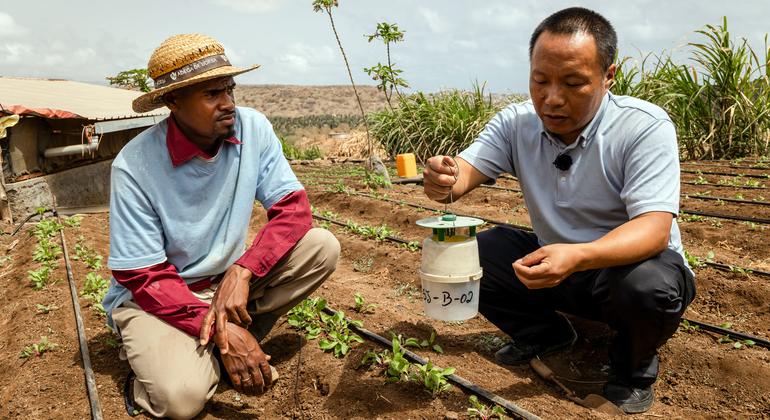Cabo Verde reverses climate change through South-South cooperation

The United Nations agency facilitates experts from China to share their knowledge and skills with farmers in the West African country through a collaborative process known as South-South cooperation.*
Cabo Verde consists of 10 islands located in the central Atlantic Ocean, 9 of which are inhabited.
Although the country’s name means “Green Nose” in Portuguese, at this time of year the country is not that green. The harsh dry season only gets hotter until July, when the rainy season is expected to begin.
Drought and pests
During this period, water became the most valuable resource for farmers. When reserves from the last rainy season ran out, they were forced to buy water, affecting profits.
Climate change also leads to increased soil erosion while reducing soil fertility. Rising temperatures also make Cabo Verde a favorable environment where new pests can thrive.
Fall armyworm has devastated corn crops since appearing in the country in 2017. Other pests include fruit flies, which mainly attack mango harvests, and tomato maggots, named after their favorite target.
Seek help
Because FAOCabo Verde has requested support to combat these challenges, which China can offer.
South-South cooperation refers to technical partnerships between developing countries in the Global South. Projects combine the technology and experience of visiting countries with the needs and requirements of the host country, transferring knowledge and skills through partnerships.
In this case, China passed on to Cabo Verde what it learned in its own rural areas, very similar to what was inland in Santiago, the largest island in the chain.
Farmers Willy and Nena work together in Santiago on land affected by drought and pests. They participated in a training course on soil management and pest control organized by FAO as part of a project under the FAO-China South-South Cooperation (SSC) Programme.
“It was a great help to me,” Willy recently told the UN agency. “This is the first time I’ve participated in a training program that talks about what we really need.”

CABO VERDE 2024. Farmers trained as part of FAO’s South-South China Cooperation (SSC) Program
Learning and development
Willy had not previously paid much attention to soil, considering it just a basic input, but Yanhua Zeng, a soil and horticulture expert sent by China’s Ministry of Agriculture and Rural Affairs, soon changed that.
Willy has learned to recognize nutrient-deficient soil and now uses goat manure and crop residue to improve soil quality.
Katya Neves, FAO Assistant Representative in charge of the program in Cabo Verde, recalls Willy mentioning that he used to buy organic fertilizer.
“Now he’s learned how to do it,” she said, “and the money he can potentially save will support another part of his farm. So with the money he saves, he can invest in other things on his farm.”
Since his training, Willy has worked with other farmers, sharing his knowledge and what he learned from experts, thereby realizing one of the project’s goals: that the training created and transmitted to farmers will be more widely disseminated by farmers themselves.
*You can read the full FAO report This.
Turn trash into treasure
Small Island Developing States (SIDS) like Cabo Verde face unique challenges in pursuing sustainable development, but their vibrant green economies offer enormous potential for growth And innovation. With the UN-supported SIMILI project, the country is now turning waste into treasure in the coastal community of Salamansa.

The goal of the UN-supported SIMILI project is to create a closed-loop system where waste becomes a valuable resource.
This innovative initiative turns discarded fishing nets into handmade fabrics used to make handbags and other items for sale, while minimizing waste generated during production and being recycled wherever possible. whenever possible.
Here’s how it works:




